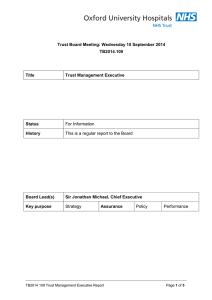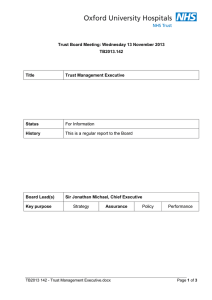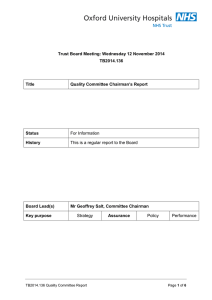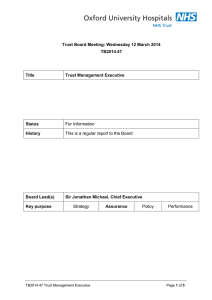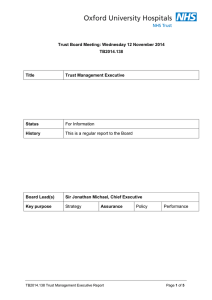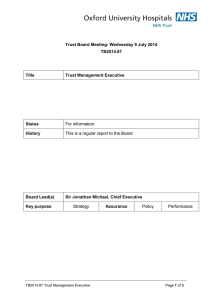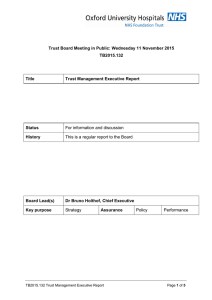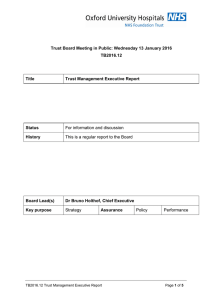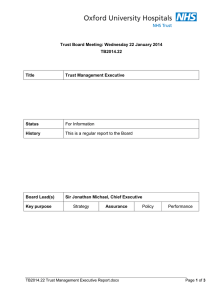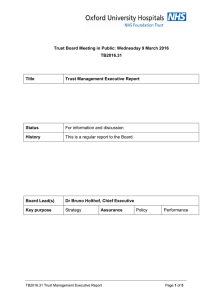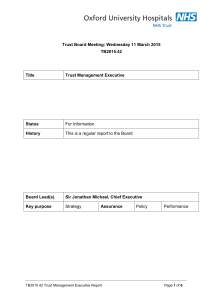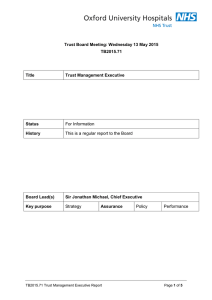For Information This is a regular report to the Board
advertisement
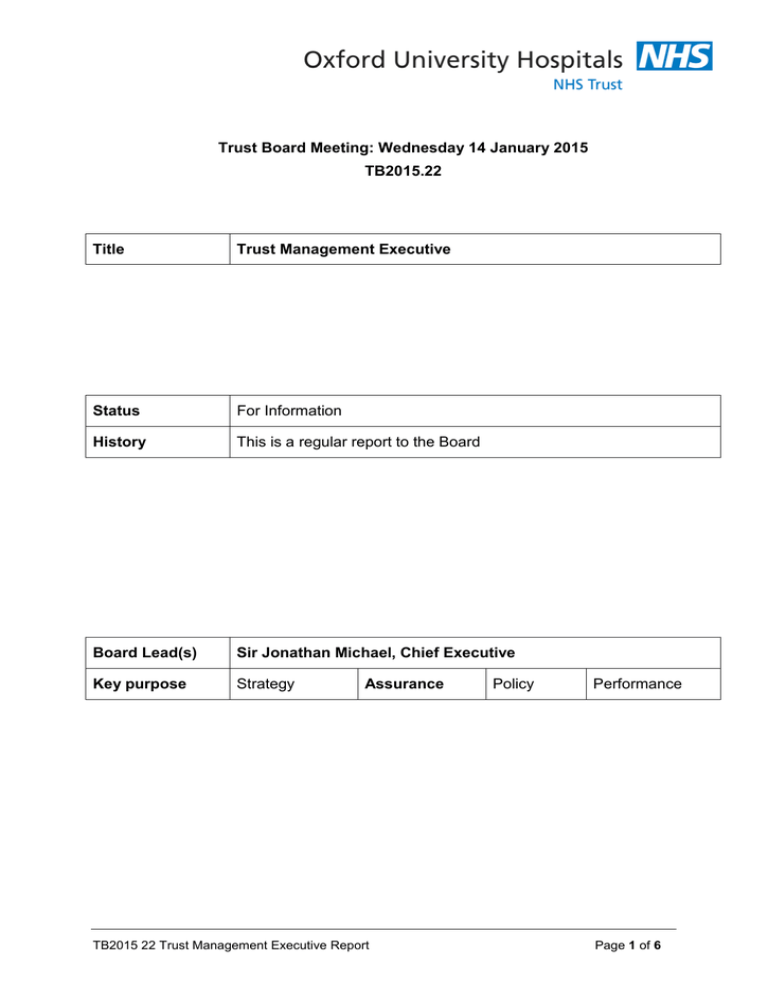
Trust Board Meeting: Wednesday 14 January 2015 TB2015.22 Title Trust Management Executive Status For Information History This is a regular report to the Board Board Lead(s) Sir Jonathan Michael, Chief Executive Key purpose Strategy Assurance TB2015 22 Trust Management Executive Report Policy Performance Page 1 of 6 Oxford University Hospitals TB2015.22 1. Introduction Since the preparation of its last report to the Trust Board, the Trust Management Executive [TME] has met on the following dates: • • • 13 November 2014; 27 November 2014; and 11 December. The main issues raised and discussed at the meetings are set out below. 2. Significant issues of interest to the Board The following issues of interest have been highlighted for the Trust Board: • Operational performance has continued to be monitored closely over months 6 and 7, and projections for the delivery of operational performance standards in Q3 and Q4 were reviewed, in advance of submission to Monitor on 28 November 2014. The projections submitted reflected a recognition that the greatest risk was that the Trust would not meet the 4 hour A&E standard in Q3 or Q4, and that there were factors affecting this which lay beyond the Trust’s direct control. It was reported that action had been taken to improve performance against the Cancer standard for 62 day wait from urgent GP referral, but there was still recognised to be a risk that this standard might not be met in Q3 or Q4. All efforts have remained focussed on delivering the best possible operational performance. • Regular reports have been received on the Trust’s financial performance, identifying underlying factors which could potentially affect the year-end position. Divisional financial recovery plans address the factors identified as having led to variances to plan to date, to ensure delivery of a recurrent balance for next year. • Outcomes of the Quarter 2 Divisional Performance Reviews were reported, covering quality, operational and financial performance of each clinical division. It was reported that each division’s financial recovery plan had been tested, and measures aimed at improving the delivery of key operational performance standards were reviewed. Action plans were requested to achieve improved appraisal rates, and an increased level of compliance with statutory and mandatory training. Specific measures to achieve further improvement in the rate of venous thromboembolism [VTE] assessment were discussed with those divisions where performance remained below the standard. • Amendments proposed to refresh the Trust’s Quality Strategy were considered, to clarify the Trust’s strategic goals for providing high quality services for the local population over the next five years, more explicitly linking with the quality priorities, and the Quality Account. TB2015 22 Trust Management Executive Report Page 2 of 6 Oxford University Hospitals TB2015.22 • TME received a report on the review undertaken of the policies and practices for escalating issues relating to quality performance. A revised escalation framework was proposed, as part of an effective model of governance, to ensure divisional and Board accountability. • Monthly updates have been provided on progress in the Action Plans relating to the compliance actions, and advisory actions, identified in the Care Quality Commission [CQC] Inspection Visit Report. In particular, TME has monitored progress towards the completion of compliance actions relating to recruitment to theatres staff vacancies, maternity staffing, and the supervision of midwives. • Updates have been provided on the conduct of negotiations with Oxfordshire Clinical Commissioning Group [OCCG], Oxford Health Foundation Trust [FT], and Oxfordshire County Council to reach an agreement on the proposal to be submitted in relation to the Better Care Fund, due by 9 January 2015. • Briefing was provided on new regulations that came into force requiring that each Director (Executive and Non-Executive) of NHS organisations has ‘the necessary qualifications, skills and experience’ (the Fit and Proper Person Test), and that Health Service bodies are transparent with the ‘relevant person’, when certain incidents occur in relation to care and treatment provided (the Duty of Candour). • A report was received on publication of the proposed tariff for 2015/16, out to consultation until 25 December 2014. An analysis was being carried out to determine whether the impact was likely to be materially detrimental, particularly taken with the ‘downside’ element of the long term financial model (LTFM). The Trust intended to respond to the consultation on the basis of this analysis. • Proposals were advanced for the development of divisional business plans for 2015-17, taking into account Monitor’s planning guidance for foundation trusts. • An update was provided on the interventions and initiatives being pursued to meet the challenges currently being experienced by the Trust in relation to the recruitment and retention of staff. • Regular reports were received from sub-committees of the TME, including the CIP Steering Group, the Workforce Committee, and the Clinical Governance Committee [CGC]. Issues highlighted by the CGC for specific consideration by TME included: o Reinforcement of the OUH Patient Identification Policy, and the introduction of a new procedural checklist, following investigation into an incident on the Newborn Care Unit o Update on the delivery of same sex accommodation TB2015 22 Trust Management Executive Report Page 3 of 6 Oxford University Hospitals TB2015.22 o Commissioning of a review and benchmarking exercise in relation to resuscitation training o Exemption of Radiologists from Methotrexate training until 31 March 2015, in the expectation that all Radiologists would undertake the new High Risk Medicines module, available from April 2015 o Request that a formal evaluation of the newly constituted Clinical Effectiveness Committee be provided to CGC in June 2015. Key issues reported as having been discussed at the CIP Steering Group included: o Progress in delivery of the programme for 2014/15, and remedial measures taken (including in relation to the workforce programme) to ensure achievement of the plan at year-end o Significant progress in the development of the Transformation projects o Progress in the delivery of the procurement savings programme, which was expected to deliver its requirements in 2014/15 and beyond, and in delivery of the medicines management category o Delivery of the Project Outline Documents (PODs) for 2016/17, and the subsequent Quality Impact Assessment process. Key Risks Discussed Key risks discussed by the TME included: 2.1. A formal updated risk assessment was undertaken in relation to out of hours paediatric airway cover. Following the implementation of steps to minimise the risk, and subject only to clarification of the competency levels of all first responders, the revised risk score of 5 (moderate risk) was accepted as valid, and consistent with providing a safe service; 2.2. A review of hip fracture mortality at the Horton Hospital was considered, and its recommendations noted. It was agreed that work should be undertaken to develop a business case, taking fully into account the resource implications of implementing the key recommendations, and this will be overseen by a Lead Consultant in the Trauma Unit; 2.3. Assurance was provided that the Trust had made appropriate plans and preparations for the care of patients with suspected Ebola virus infection, and for the management of risk of cross-infection to staff and the public; 2.4. Progress in the prevention of pressure ulcers and improved tissue viability was reported; 2.5. The importance of maintaining the excellent national reputation of the Oxford Craniofacial Service was considered, having regard to succession planning with the appropriate balance of input from surgical specialities, specifically plastic surgery and maxillo-facial surgery. TB2015 22 Trust Management Executive Report Page 4 of 6 Oxford University Hospitals TB2015.22 Whilst there were no patient safety concerns associated with the current service provision, a review has been commissioned with the Royal College of Surgeons, to ensure that as the service expanded, as was anticipated, it would meet with all required national standards; 2.6. Divisional Directors were asked to ensure adherence to a clearly defined procedure for identifying and responding to all potential ‘Never Events’; 2.7. Issues of concern raised about theatres were reported to be under investigation, progress in which would be reported to TME; 3. Key decisions taken Key decisions made by the TME included: 3.1. Support for the Business Case for a self-funded substantive appointment of a 10 PA Consultant Spinal Surgeon, and an increase of 3 PAs in the support provided to the service by consultants from Great Western Hospitals NHS Foundation Trust, Swindon; 3.2. Approval for the introduction of the “Recommend a Friend” Scheme, a recruitment initiative in the Surgery and Oncology Division; 3.3. Support for the Business Case for 1 whole time equivalent [WTE] Nephrology Consultant, to replace a retiring consultant, and for the Business Case for 3 WTE additional Nephrology Consultants, to be funded by the Trust from the start of the financial year 2015/16, on the basis that a comprehensive review of the nephrology service should be undertaken; 3.4. Approval for the recommendation for capital investment to provide a paediatric outpatient facility at the Horton Hospital, to deliver important quality improvements, and better use of the estate, with the cost to be offset by income received; 3.5. Approval for the implementation of Chemocare as the electronic prescribing system for Children’s chemotherapy; 3.6. Support in principle for the Business Case for the expansion of the Trust’s Critical Care capacity, subject to a review of costs in the light of the anticipated potential impact of the reduction in tariff for specialist services; 3.7. Approval for the release of project costs to develop a full Business Case for the development of the Horton Endoscopy Unit; 3.8. Support for the Business Case for 1 WTE replacement Consultant Haematologist, and 1 WTE replacement Consultant Haematologist (Haemophilia and Thrombosis), both of which posts were fully funded; TB2015 22 Trust Management Executive Report Page 5 of 6 Oxford University Hospitals TB2015.22 3.9. Approval for the supply and installation of an electrical sub-station, to meet the power requirements for approved new developments at the John Radcliffe site; 3.10. Support for the appointment of a specialist project lead, to develop a full Strategic Outline Case for Theatres; 3.11. Support for the development of a Trust-wide strategy for the provision of Critical Care, taking into account as appropriate specific needs on each site; 3.12. Approval for the recommended changes to improve the effectiveness of the Clinical Governance Committee [CGC] and its sub-committees; 3.13. Agreement to a number of key budget principles which would form the basis for next year’s budget setting; 3.14. Support for the five year forward look strategy for respiratory services, in the expectation that individual business cases would need to be developed to achieve implementation 4. Future Business Areas on which the TME will be focusing in the next three months include the following: • • • • • • • • Monitoring delivery of operational performance standards; Monitoring financial performance; Monitoring quality performance; On-going monitoring of Action Plans relating to CQC Inspection and Report; Update on next phase of the Peer Review Programme; Quality Impact Assessment of CIPs; Review of Trust-wide Health Records Audit; Digital Communications Strategy, including Social Media Policy 5. Recommendation The Trust Board is asked to note the contents of this paper. Sir Jonathan Michael Chief Executive January 2015 TB2015 22 Trust Management Executive Report Page 6 of 6
